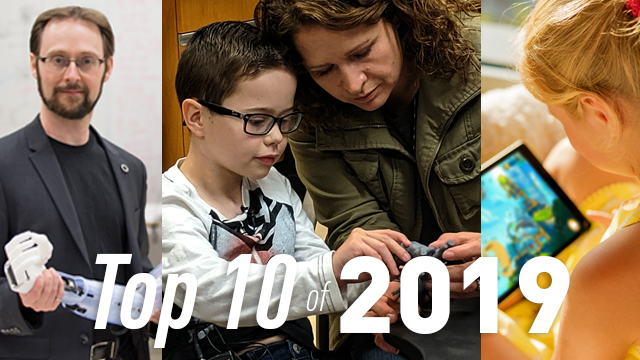
Researchers at the University of Alberta followed 3,455 children in four large Canadian cities from 2009 to 2012 and found those who had two or more hours of screen time per day were six times more likely to have attention problems at school.
2. The Globe and Mail: Young Alberta transplant patient gets Star Wars-themed 3D model of his heart
Mason Thomas was six when he received a new heart at the Stollery Children's Hospital in Edmonton. He asked to see his damaged one but it was discarded after the surgery. To help the now eight-year-old understand why he needed a new ticker, experts at the U of A printed two 3D models of the organ from his CT scans. One model of the red muscle and its pumps was put inside a tiny TIE Fighter for the young Star Wars fan.
Study co-author Peter Silverstone, a professor of psychiatry at the U of A, comments on research showing rates of mental illness rose among youth in Fort McMurray in the wake of the wildfire that devastated the region in 2016.
4. National Post: From bionic arms to predicting patient surges in ER, AI is reshaping patient care
Artificial intelligence (AI) is having a growing impact on the medical field. This story features the work of Patrick Pilarski, Canada Research Chair in Machine Intelligence for Rehabilitation. His research team is testing a new generation of prosthetic-an experimental bionic arm that can "learn" to adapt and anticipate an amputee's movements, employing the power of AI.
5. NBC News: Vitamin E now a focus of the investigation into some vaping illnesses
Vitamin E acetate is a focus of an ongoing investigation into vaping-related respiratory illnesses. As a resident physician at McMaster University Medical Centre, Dilini Vethanayagam, now an associate professor of respirology at the U of A, published a case report on a woman who had vaping-related lipoid pneumonia. She provides expert comment in the story.
A study led by Michael Kolber, an associate professor of family medicine at the U of A, suggests the risk of major internal bleeding posed by taking a daily dose of aspirin outweighs any preventive benefits for people who have never suffered a heart attack or stroke.
Vivian Mushahwar, the Canada Research Chair in Functional Restoration at the U of A, says her research could restore standing and walking functions to those with damaged spinal cords. Through her team's work she has helped develop an electrical spinal implant as well as an improved map of the spinal cord.
8. Edmonton Journal: Treating Alzheimer's: U of A research closes in on possibility
A study led by U of A neurologist Jack Jhamandas has brought researchers one step closer to what they say could be an effective treatment for Alzheimer's disease.
The U of A has formed a partnership with Atlas Biotechnologies to explore and research the use of medical cannabis to treat a variety of neurological conditions, specifically multiple sclerosis, Alzheimer's and Huntington's diseases.
10. Global News: Edmonton area group aims for Guinness baseball record, $250K cancer research donations
Fifty-six people set out to attempt a Guinness World Record by playing a baseball game for 85 hours. Money was raised through the game for the Cure Cancer Foundation in support of a new drug and therapeutic development at the U of A.